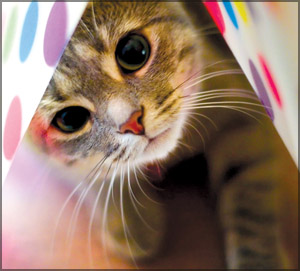
Nutrition for cats
Have you ever wondered what the best nutritional diet you could give
your cat? Today we will enlighten you about some important facts about
the eating habits and the important parts of a healthy diet for cats.
Did you know that cats are strict meat-eaters, also known as
carnivores? They require relatively higher amounts of dietary protein
and fat than omnivores such as dogs and humans do. However, carnivores
animals still have complex nutritional needs, and cats must be fed a
diet specifically formulated and balanced to meet those needs.
Proteins
Unlike dogs, which convert primarily carbohydrates and fat for
energy, cats meet most of their energy needs through protein. Cats
therefore require significantly more protein in their diets than dogs.
Kittens in turn, require even more protein than adult cats.
These building blocks of proteins are called amino acids, about
twenty of which are required by all animals. Although some can be produced by the body, as long as there is adequate
dietary nitrogen, others - the essential amino acids - cannot be
produced, and therefore, must be in the diet.
Although some can be produced by the body, as long as there is adequate
dietary nitrogen, others - the essential amino acids - cannot be
produced, and therefore, must be in the diet.
Fats
Fats are an important component of a cat's diet. In addition to being
a source of energy, it provides the essential fatty acids and acts as a
carrier of the fat-soluble Vitamins A, D, E and K.
Fat also improves the taste of food. Without an adequate intake of
dietary fat, cats may develop flaky skin and a greasy coat. In severe
cases, fatty acid deficiency may lead to problems such as slow growth
and weight loss, impaired wound healing and increased vulnerability to
infection.
Vitamins and minerals
Diets formulated to be complete and balanced for cats will contain
adequate amounts of fat and water-soluble vitamins.
Vitamins such as A, E and the B-complex are added to food because
they are not otherwise produced by the bodies of cats. Because
petroleum-containing or mineral oil hairball remedies (means of
counteracting )interfere with the intestinal absorption of fat-soluble
vitamins, it is important to avoid excess administration of such
remedies.
Minerals such as calcium, phosphorus, magnesium, potassium, sodium
and chloride are as important as other dietary components (parts of a
larger whole). One important point to remember is that, although cats
are carnivorous, they can develop calcium deficiency if fed an all-meat
diet without some bone materials or supplemented minerals.
Water
Water is possibly the most essential dietary need for cats and other
living things. Regardless of whether they are fed primarily canned or
dry food, cats require clean, fresh water at all times. Even a few days
without water can lead to severe physiological stress and even death.
So, always keep an eye on what your cat eats. Give your little pet a
healthy diet. |
